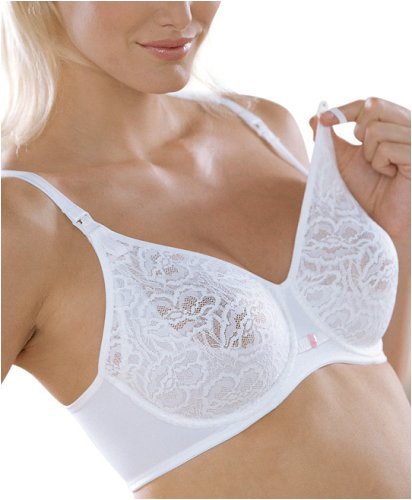
There are a lot of different styles and price ranges in maternity nursing bras on the market today, so it can be overwhelming for first time moms to know where to start in their search. Here are a few tips to keep in mind when shopping:
1) Maternity nursing bras should have plenty of stretch and fit comfortably. When you are nursing, your breast size can fluctuate up to a full cup size over the course of the day. Some bras are designed to fit several cup sizes to help account for this ongoing change. Bras that fit too tight can lead to plugged ducts and breast infections called mastitis.
2) Maternity nursing bras should provide support from under the breast when the cup is open for nursing. This makes feeding easier and more comfortable as well as more discreet. It also makes re-closing the bra an easier task.
3) Avoid underwires for your first nursing bra. In the first few weeks your breast tissue is expanding very rapidly. Underwires can cut into milk producing tissue which can obstruct and clog the milk ducts and lead to infection. Once your milk supply settles down after the first month or two of nursing, you may be just fine with a properly fitted underwire bra, but it is usually better to wait past the early weeks.

4) You only need to start out with 3-4 maternity nursing bras for the first few weeks: one to wear, one to laundry, and one or two in the drawer. It's best to buy only one of a particular style to test it out to see how much you really like it. It you do like it, buy more of that style, maybe in different colors to keep it interesting. However, you do not want to buy too many maternity nursing bras in the early weeks because your size is subject to change and you may find your cup size has gone down after a month or so when your milk supply has settled down.
5) Larger busted women need maternity nursing bras with better support. Also, if you are larger busted you may be more comfortable wearing a sleep or light support nursing bra at night. When you are nursing, not only are your breasts larger, they are also heavier. So, support becomes very important for comfort and to reduce permanent sagging.

6) During pregnancy your ribcage can expand several inches, affecting your bra band sizing. After you have your baby, your rib cage will gradually return to its pre-pregnancy size even though your cup size will remain larger if you are nursing. When you are fitting yourself for a maternity nursing bra during the last months or pregnancy or soon after you have your baby, look for adjustable hooks on your bra band in the back. You will want to start out comfortably on the tightest setting so that your bra will continue to fit you as your rib cage goes down in size you and you tighten your band setting.

If you purchase a bra online or through a catalogue, follow the retailer's instructions for measuring for the correct size. Bra sizes can vary a bit from brand to brand, so it's important to purchase a bra that fits you correctly rather than one that is the size you think you should be. Most of all, do not wear a bra that is too tight in the cups or under the arm which could lead to clogged ducts. There are many fashionable maternity nursing bras on the market today, but for starters go for comfort.
Technorati Tags:Maternity Nursing Bras,Maternity Bras,Maternity Clothing Tips,Maternity Lingeries












No comments:
Post a Comment